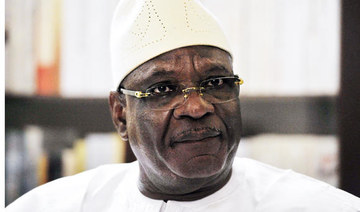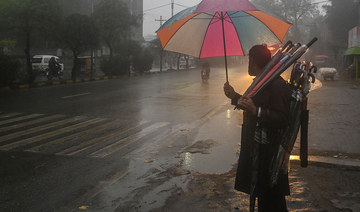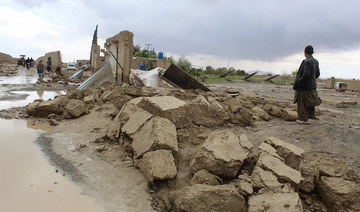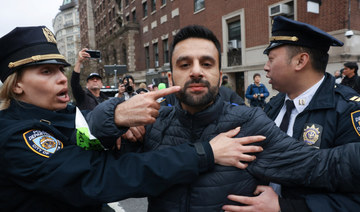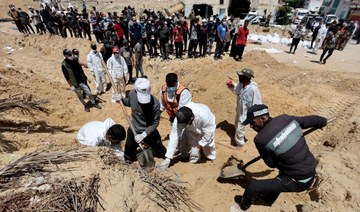BAMAKO: Mali’s former president Ibrahim Boubacar Keita, who led the West African country from 2013 until he was ousted in a coup in 2020, died aged 76 in the capital Bamako on Sunday, his family said.
Mali’s interim government issued a statement hailing “the memory of the illustrious” Keita, adding that the former president died “after a long illness.”
Looming over most of Keita’s presidency was the extremist insurgency that has rocked the poor Sahel country since 2012. His toppling marked the rise of the military junta now under regional sanctions for failing to restore civilian rule.
Keita was forced out of office on August 18, 2020, by young military officers who staged an uprising at a base near Bamako before heading into the city, where they seized Keita and other leaders.
In an interview broadcast on state television Saturday evening, the Prime Minister of the interim administration Choguel Kokalla Maiga denounced the corruption and impunity he said marked the end of Keita’s rule.
But on Sunday Foreign Minister Abdoulaye Diop said he was “saddened to learn of the death of former president Ibrahim Boubacar Keita,” adding that “it is with great emotion that I bow before his memory.”
Macky Sall, president of neighboring Senegal, said in a Tweet he was “saddened” by the news, while Niger’s ex-president Mahamadou Issoufou, a former comrade of Keita’s in the Socialist International, hailed him as “a cultured man, a great patriot and a pan-Africanist.”
Politicians and other public figures went to Keita’s home southwest of Bamako to pay their respects, with police guarding the entrances, according to AFP journalists at the scene.
“He was a father to me,” said Amadou Koita, who was government spokesman under Keita, sitting in the courtyard dotted with mango trees.
Moussa Timbine, a former parliament speaker close to the late president, described him as a man “of peace and dialogue.”
The government statement said funeral plans would be announced at a later date.
In the weeks before the 2020 coup, Keita had been struggling with protests fueled by his handling of the extremist insurgency and failure to turn around Mali’s floundering economy.
Snail-paced political reforms, decrepit public services and schools, and a widely shared perception of government corruption also fed anti-Keita sentiment, driving tens of thousands of protesters into the streets.
Seized by the putschists, the junta that emerged from the rebellion — under pressure from the West African bloc ECOWAS — released Keita weeks later and returned him to his residence in Bamako, under surveillance.
He suffered a mini-stroke the following month, and was sent to United Arab Emirates for treatment. He had been based at his Bamako home since, staying out of public life.
The ruling junta would stage another coup in May 2021, toppling a civilian transitional government.
The junta had vowed to hold elections next month to transition the country back to civilian rule. But at the end of the last year, the junta revised its timetable, saying it could stay in power for up to five years.
In response, ECOWAS agreed to sanction Mali earlier this month, imposing a trade embargo and shutting borders, in a decision backed by the United States, the European Union and former colonial power France.
Landlocked Mali, one of the world’s poorest countries, is already feeling the effects of the sanctions, prompting thousands to protest in Bamako on Friday.
The son of a civil servant, Keita was born in the southern industrial city of Koutiala, the declining heartland of cotton production.
After studying literature in Mali, Senegal and France, Keita became an adviser for the EU’s overseas development fund before heading a development project in northern Mali.
He then rose through the ranks under Alpha Oumar Konare, the country’s first democratically elected president.
As a socialist prime minister between 1994 and 2000, he quelled a series of crippling strikes, earning a reputation as a firm leader and helping to set up his landslide election in 2013.
Keita was re-elected in 2018.
Mali ex-president Keita dies two years after coup ouster
https://arab.news/gjdbp
Mali ex-president Keita dies two years after coup ouster
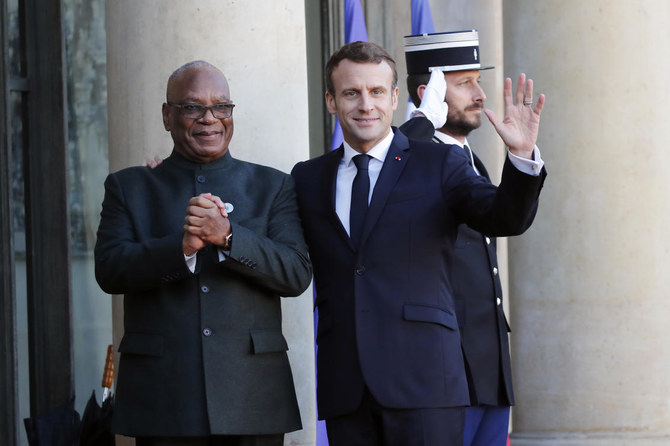
- Looming over most of Keita’s presidency was the extremist insurgency that has rocked the poor Sahel country since 2012
- His toppling marked the rise of the military junta now under regional sanctions for failing to restore civilian rule
155 killed in Tanzania as heavy rains lash East Africa
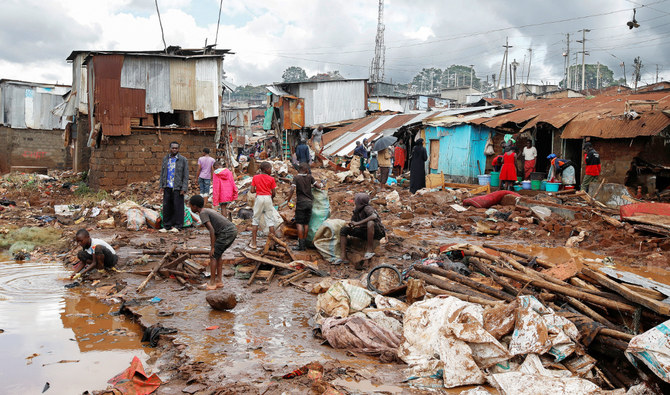
- Kenyan president convenes emergency multi-agency meeting to respond to crisis after floods cause chaos
DAR ES SALAAM, Tanzania: At least 155 people have died in Tanzania as torrential rains linked to El Nino triggered flooding and landslides, Prime Minister Kassim Majaliwa said on Thursday.
Tanzania and other countries in East Africa — a region highly vulnerable to climate change — have been pounded by heavier than usual rainfall during the current rainy season, with dozens of deaths also reported in Kenya.
Majaliwa said the rains have affected more than 51,000 households and 200,000 people, with 155 fatalities and 236 injuries.
“The heavy El Nino rains, accompanied by strong winds, floods, and landslides in various parts of the country, have caused significant damage,” Majaliwa told parliament in Tanzania’s capital, Dodoma.
He added: “These include loss of life, destruction of crops, homes, citizens’ property, and infrastructure such as roads, bridges, and railways.”
El Nino is a naturally occurring climate pattern typically associated with increased heat worldwide, drought in some parts of the world, and heavy rains elsewhere.
It can have a devastating impact on East Africa.
In Burundi, around 96,000 people have been displaced by months of relentless rains.
In addition, about 45 people have been killed in Kenya since the start of the rainy season in March, including 13 who lost their lives in flash floods in the capital, Nairobi, this week.
Kenyan President William Ruto convened an emergency multi-agency meeting on Thursday to respond to the crisis after torrential rains triggered floods that caused chaos across the city, blocking roads and bridges and engulfing homes in slum districts.
Kenyans have been warned to stay on alert, with more heavy rains forecast across the country. Officials said people living in the most vulnerable areas would be relocated.
“The government ... will do whatever it takes, apply all the required resources in terms of money and personnel to make sure that lives are not lost and the people of Kenya are protected from this disaster,” Deputy President Rigathi Gachagua told a press briefing.
Meanwhile, the UN humanitarian response agency OCHA said in an update this week that in Somalia, the Gu (April to June) rains are intensifying, with flash floods reported since April 19.
It said four people had been reportedly killed, and at least 134 families or more than 800 people were affected or displaced across the country.
Late last year, more than 300 people died in torrential rains and floods in Kenya, Somalia, and Ethiopia just as the region was trying to recover from its worst drought in four decades that left millions of people hungry.
From October 1997 to January 1998, massive floods caused more than 6,000 deaths in five countries in the region.
In March, the UN’s World Meteorological Organization said that El Nino, which peaked in December, was one of the five strongest ever recorded.
Though the weather pattern is gradually weakening, its impact will continue over the coming months by fueling the heat trapped in the atmosphere by greenhouse gases, it said.
Therefore, the WMO said in a quarterly update that “above normal temperatures are predicted over almost all land areas between March and May.”
‘Uncommitted’ organizers will join campus protesters in Michigan over Gaza

- Student protests in the US over the war in Gaza have intensified and expanded over the past week
- Democrats have become increasingly uneasy over the US support for Israel as the death toll and destruction climb in Gaza
WASHINGTON: Organizers behind the “uncommitted” political movement against President Joe Biden’s staunch support for Israel’s war against Hamas will travel to the University of Michigan’s campus on Thursday to join students protesting the war.
Student protests in the US over the war in Gaza have intensified and expanded over the past week after police first arrested students at Columbia, with so-called Gaza solidarity encampments established at colleges, including Yale, and New York University. Police have been called in to several campuses to arrest hundreds of student demonstrators.
Uncommitted organizers will travel to the University of Michigan’s Ann Arbor campus, they told Reuters, bringing together a political movement that’s disrupted Biden events and amassed hundreds of thousands of votes in Democratic primaries and a student movement that’s drawn students and faculty of various backgrounds.
Biden won Michigan by less than a 3 percent margin in 2020.
Democrats have become increasingly uneasy over the US support for Israel as the death toll and destruction climb in Gaza. A growing revolt inside the Democratic base signifies the challenge Biden faces in bringing together the coalition he needs to defeat Republican frontrunner and former President Donald Trump.
“President Biden is choosing to put his hands over his ears and ignore the hundreds of thousands of people who have already come out against the war at the ballot box,” said Abbas Alawieh, a prominent “Uncommitted” organizer, who is going to Ann Arbor with Layla Elabed, another Michigan organizer.
“Signing into law more money for Israel is sending a clear message to uncommitted voters, young voters that he doesn’t care to engage seriously with our demands to end this war,” he said, referring to the $26 billion in new aid Biden recently approved.
Alawieh said the uncommitted movement has not been coordinating with student groups so far. “We have an electoral focus, but we certainly see the demands of student protesters, who are calling for peace,” he said.
On campuses where protests have broken out, students have issued calls for a permanent ceasefire in Gaza, an end to US military assistance for Israel, university divestment from arms suppliers and other companies profiting from the war, and amnesty for students and faculty members who have been disciplined or fired for protesting.
Biden told reporters on Monday that he condemned both “antisemitic protests” and “those who don’t understand what’s going on with the Palestinians.” Biden campaign spokeswoman Lauren Hitt has said the president “shares the goal for an end to the violence and a just, lasting peace in the Middle East. He’s working tirelessly to that end.”
Trump called the campus protest situation “a mess” as he walked into his criminal trial in New York.
The uncommitted movement amassed sizable vote totals in Michigan, Minnesota and Hawaii primaries and had won 25 delegates as of the beginning of April. They are preparing to target the Democratic National Convention in Chicago in August, where Biden is expected to be nominated.
Polls show Biden and Trump running neck-and-neck ahead of their Nov. 5 election rematch nationally. Biden’s 2020 victory was due to narrow wins in key swing states like Michigan.
US nudges Germany on long-range missiles for Ukraine

- Washington confirmed the day before that it had sent Ukraine a variant of the ATACMS missile with a range of 300 kilometers
- “In terms of Taurus... this is a decision for Germany,” a senior US defense official told journalists
WASHINGTON: The United States hopes decisions by it and allied countries to send long-range missiles to Ukraine may encourage similar action by Germany, which has so far refused to provide its Taurus missiles, a US official said Thursday.
Washington confirmed the day before that it had sent Ukraine a variant of the ATACMS missile with a range of 300 kilometers (190 miles), while France and Britain have respectively supplied SCALP and Storm Shadow missiles, both of which have a range of about 250 kilometers.
“In terms of Taurus... this is a decision for Germany,” a senior US defense official told journalists when asked if the provision of long-range ATACMS could clear the way for Taurus missiles to be sent to Kyiv.
“But certainly the US provision of ATACMS as well as prior decisions by the UK and France to provide long-range cruise missiles, we would certainly hope that this would be a factor,” the official said, speaking on condition of anonymity.
Kyiv has long pushed for Germany to provide it with Taurus missiles — which can reach targets up to 500 kilometers away — to help its fight against invading Russian forces.
But Berlin has declined to send the missiles, fearing that it would lead to an escalation of the more-than-two-year-old conflict.
Moroccan man guilty of murdering man in UK in revenge for Gaza
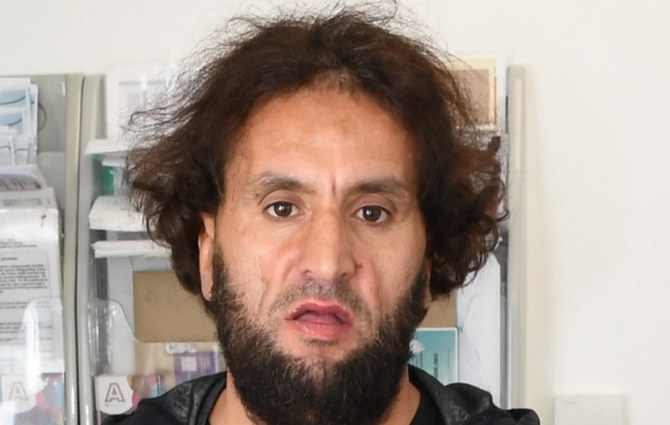
- Ahmed Alid killed his 70-year-old victim after approaching him from behind
- After his arrest, he told detectives he had committed the acts because of the conflict in Gaza, and in revenge for Israel killing innocent children
LONDON: A Moroccan man who stabbed to death a passer-by in the street in northeast England in what he later told police was revenge for Israeli action in Gaza was found guilty of murder on Thursday.
Ahmed Alid, 45, who had sought asylum in Britain, killed his 70-year-old victim after approaching him from behind on a road in Hartlepool the early hours of Oct. 15 last year, having previously attacked his housemate with two knives, prosecutors said.
After his arrest, he told detectives he had committed the acts because of the conflict in Gaza, and in revenge for Israel killing innocent children, blaming Britain for creating Israel, Britain’s Crown Prosecution Service (CPS) said.
Alid said if he had had a machine gun, and more weapons, he would have killed more people.
“By his own admission, Ahmed Alid would have killed more people on that day if he had been able to,” Nick Price, Head of the CPS Special Crime and Counter Terrorism Division, said in a statement.
“Whatever his views were on the conflict in Gaza, this was a man who chose to attack two innocent people with a knife, and the consequences were devastating.”
Alid had first used two knives to attack his sleeping housemate, to whom he had become aggressive after learning of his conversion to Christianity, stabbing him six times while shouting “Allahu Akbar,” or “god is greatest,” the CPS said.
The 32-year-old housemate, one of five asylum seekers who shared the property, managed to fight him off and another occupant came to his aid. Alid left the house with one of the knives and walked toward the center of Hartlepool.
He passed Terence Carney on the opposite side of the road before circling back and attacking him from behind, stabbing him six times in the chest, abdomen and back. Carney died shortly after police arrived.
Following his interview with police, he attacked the two female detectives, with one suffering injuries to her shoulder and wrist.
He was found guilty at Teeside Crown Court of murder, attempted murder and two counts of assaulting an emergency worker. He will be sentenced on May 17, when the judge will decide if his actions were related to terrorism.
India dismisses US human rights report as ‘deeply biased’
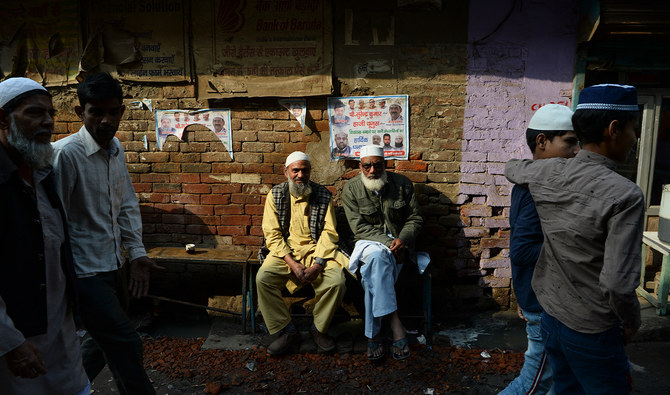
- Report found “significant” abuses in India’s Manipur state and attacks on minorities, dissenters
- India’s foreign ministry spokesperson says New Delhi does not attach any “value” to the report
NEW DELHI: New Delhi said on Thursday it does not attach any value to a US State Department report critical of human rights in India, and called it deeply biased.
The annual human rights assessment released earlier this week found “significant” abuses in India’s northeastern Manipur state last year and attacks on minorities, journalists and dissenting voices in the rest of the country.
Asked about it, Indian foreign ministry spokesperson Randhir Jasiwal told journalists on Thursday that the report “as per our understanding, is deeply biased and reflects a very poor understanding of India.”
“We attach no value to it and urge you to also do the same,” Jaiswal said.
Responding to a question about the growing protests on US university campuses against Israel’s offensive in Gaza that has killed more than 33,000 people, Jaiswal said that “there has to be the right balance between freedom of expression, sense of responsibility and public safety and order.”
He added that “democracies in particular should display this understanding in regard to other fellow democracies, after all we are all judged by what we do at home and not what we say abroad.”
While India and the US have a tight partnership, and Washington wants New Delhi to be a strategic counterweight to China, the relationship has encountered some minor bumps recently.
In March New Delhi dismissed US concerns over the implementation of a contentious Indian citizenship law, calling them “misplaced” and “unwarranted,” and objected to a US State Department official’s remarks over the arrest of a key opposition leader.
Last year Washington accused Indian agents of being involved in a failed assassination plot against a Sikh separatist leader in the US, and warned New Delhi about it.
India has said it has launched an investigation into Washington’s accusations but there has not been any update about the investigation’s status or findings.



